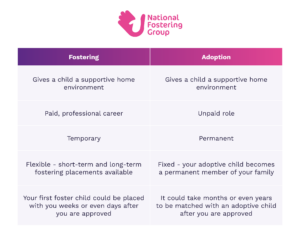Find out if you could be a foster carer
In a few simple questions, you’ll know if you’re suitable to apply to become a foster carer.
Whether you choose to be a foster parent or an adoptive parent, you’ll play an important role in a child’s life. However, there are big differences between the two roles. Deciding what’s right for you and your family is a very personal decision.
There are several differences between foster care and adoption. These include:
Foster care placements can last anything from a few days to several years, depending on the needs of the child. Some foster carers choose long-term fostering placements while others choose short-term placements that allow them more flexibility. New foster carers often start with short-term placements to build their confidence and make sure fostering is the right choice for them.
Adoptive parents take on full-time, permanent responsibility for the child until they are old enough to leave home. It’s also important to note that adoptive children have the same rights as birth children.
Being a foster carer is a career choice. This means carers have access to training and development opportunities to gain new skills. They also receive regular payments, known as a fostering allowance, which allow them to focus on their foster child full time.
Adoption is a permanent choice to expand your family. This means adoptive parents aren’t paid to look after their child and need to have a career that works around their childcare responsibilities. In some cases, they might be eligible for financial support for therapeutic care for your child, but this isn’t provided as standard.
There are many more children in the UK who need a foster home than children who need to be adopted. This means that once someone is approved as a foster parent, their first child could be placed with them within a few weeks or even days.
It usually takes about 6 months for an adoptive parent to be approved. After this, they will be matched with a child who they can choose to adopt. This process could take months or even years, depending on the matching criteria they choose. For example, there is a longer wait to adopt babies and young children.

Fostering vs adoption compared
While fostering is temporary, it’s not unusual for a child to stay with their foster parents for many years, often until they are old enough to leave care. This is known as long-term fostering and provides children with a stable and supportive home environment.
While long-term foster care isn’t the same as adoption, it does allow foster parents and their foster children to form a deeper bond:
There are some important differences in the responsibilities and rights you’ll have for the child in your care, depending on whether you’re a foster carer or an adoptive parent.
One of the biggest differences between fostering and adoption is payment.
Being a foster carer is a professional career choice. This means you will be paid a fostering allowance to look after a child. The amount you are paid is based on your experience, the number of children you are fostering and the type of placement e.g. whether it requires specialist skills or training.
Adoptive parents aren’t paid to look after the child in their care. This is because they have become a permanent member of their family. However, adoptive parents are entitled to statutory adoption leave. This means their employer must pay them a portion of their usual salary while they take time off work to welcome the child to the family. It works similarly to maternity pay, with the amount paid decreasing over time.
Occasionally, fostering can lead to adoption. This is sometimes arranged under a foster to adopt placement, where a child is placed with a foster parent who is also approved to adopt them. It’s a way for the local authority and the prospective adoptive parents to make sure that the child and parents are a suitable match.
In other cases, a foster parent may be able to adopt a child who is already in their care.
However, foster parent adoptions are relatively rare. This is because the main aim of fostering is to give children a temporary home until they are able to return to their birth family or are old enough to leave care.
That said, it’s not unusual for foster children to form strong bonds with their foster parents and to consider themselves part of the family.
At National Fostering Group we focus primarily on providing supportive foster homes for children and young people who need them. If you feel that adoption is a better choice for you, you should contact your local authority to find out more about the adoption process.
Fostering and adoption are two different but equally rewarding ways to give a child a home. If you think fostering could be the right choice for you, National Fostering Group is here to support you every step of the way.
We’re one of the largest independent fostering agencies in the UK, with the resources to support and train you. As our foster carers say, it’s one of the most rewarding and fulfilling things you can do.
You can find a wide variety of information and resources about fostering on our website. Here are some you might find particularly useful:
Becoming a foster parent – learn about the process of becoming a foster carer.